
November 25, 2008 Paul Kagame and Laurent Nkunda: Root Cause of Instability
and Genocide in Eastern Congo
BY
Sylvestre Ngoma
contact@congovision.com
Founder & Owner of Congo Vision
Introduction
International support for Rwanda after the 1994 genocide against the Tutsi and moderate Hutu may be empowering President Paul Kagame to indulge in crimes of his own while donor nations turn a blind eye to his mischief in the Democratic Republic of Congo. The outpouring of world attention, humanitarian aid and financial aid that Rwanda continues to receive to this day from international financial institutions and western governments have proven to be overwhelming. The sense of guilt for the 1994 international community failure to act in Rwanda has triggered all kinds of sympathy and investment opportunities for that country. This may have shattered any commonsensical approach to conflict resolution on the part of Tutsi extremist leaders of Rwanda who are taking advantage of the windfall to be instrumental, by sponsoring a warlord, in creating havoc in eastern Congo.
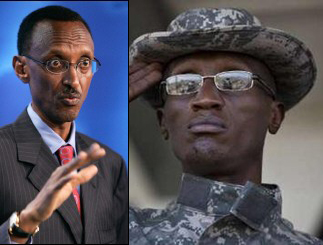 One can only wonder what President Paul Kagame and rebel leader Laurent Nkunda are expecting from the constant humiliations and unspeakable hardships that they are subjecting more than 400 Congolese ethnic groups in the Congo to. One should not underestimate the peaceful people of the Democratic Republic of Congo or test their patience and their culture of tolerance and hospitality to the limit. There will be a breaking point if these humiliations are allowed to continue time and time again. One can only wonder what President Paul Kagame and rebel leader Laurent Nkunda are expecting from the constant humiliations and unspeakable hardships that they are subjecting more than 400 Congolese ethnic groups in the Congo to. One should not underestimate the peaceful people of the Democratic Republic of Congo or test their patience and their culture of tolerance and hospitality to the limit. There will be a breaking point if these humiliations are allowed to continue time and time again.
By the way, why is it that President Kagame, his accomplice Laurent Nkunda, and the world community as a whole are not learning from history in this particular case? Belgians recall countless examples of revolts during the era of the Mighty King Leopold II and Colonial Congo. The most notable and memorable of those revolts occurred on January 4, 1959. The all-powerful President Mobutu had his share of trouble from the peaceful Congolese people he so conspicuously “tamed.” The 1980's and 1990's are fraught with examples. Recently, when the Tutsi-led rebel troops tried to take over the capital city of Kinshasa in 1998, the world saw a very combative and resilient side of the people of that city.
Rebel Leader: In Pursuit of genocide for political dividends
President Paul Kagame is exploiting, wrongfully, the 1994 genocide that occurred in Rwanda for political reasons and outright greed. Rather than learning from it, he seems to work tirelessly to instill hatred against the Tutsis in the Congo while enabling looting of the country. Maybe, he believes that he may earn more political dividends from a disaster against the Tutsis in the Congo. He seems to be pushing for it.
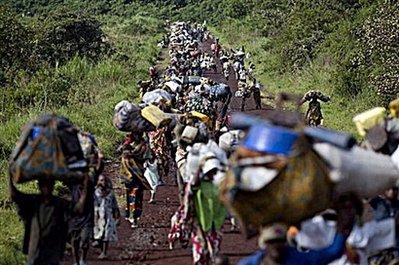
Destroying more than 5 million lives, displacing more than 2 million people (without food, drinking water or shelter), raping women and girls, dehumanizing millions of people, looting mineral resources… to supposedly protect a few thousands of Tutsis in the Congo the way Laurent Nkunda and Paul Kagame are doing is insane and does not make sense. Sooner or later, large scale massacres of Congolese civilians, targeted extermination of the Congolese workforce, systematic rapes of Congolese women as weapon of war, destruction of entire Congolese villages in the name of protecting a few Tutsi will definitely lead to unequaled perils for the perpetrators.
Genocide prevention measures after 1994 have provided Rwanda the opportunity to continually destabilize the Democratic Republic of Congo since 1996. Ultimately, humiliations of Congolese people will lead to hatred, violence, and possibly a civil war. President Paul Kagame and rebel leader Laurent Nkunda are sowing the seeds of hatred and resentment against the Tutsis they claim to protect. Extreme retaliatory atrocities will eventually occur in the Democratic Republic of Congo if the international community does not put an end to President Paul Kagame and Nkundabatware's adventure in eastern Congo. Humans react naturally to violence in three ways: resignation, non-violence or violence. The Congolese people have the reputation of knowing how to respond to violence appropriately.
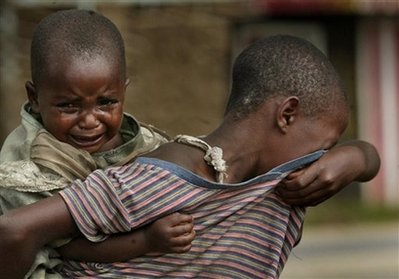 Hence, without prophesizing, we can nonetheless predict that the breaking point will be either the slaughtering of major religious, scientific or political figures (as it happened in Rwanda in 1994), a large scale massacre of members of certain ethnic groups, the secession of part of the Grand-Kivu, and the balkanization of the Democratic Republic of Congo. Do not underestimate those Congolese. Given these gruesome scenarios, who will the world blame? Besides, hasn't an arrest warrant been issued against the rebel leader Laurent Nkunda? The media chooses to flock around Nkunda to snatch interviews rather than report about the sufferings of the displaced Congolese! Not surprisingly, in his first public appearance in Rutshuru, Laurent Nkunda told a distrustful group of locals that there was enough space for foreigners in Rutshuru. One of his soldiers made the point more clearly. He said that fighting for CNDP is fighting for Rwanda. So go figure! Hence, without prophesizing, we can nonetheless predict that the breaking point will be either the slaughtering of major religious, scientific or political figures (as it happened in Rwanda in 1994), a large scale massacre of members of certain ethnic groups, the secession of part of the Grand-Kivu, and the balkanization of the Democratic Republic of Congo. Do not underestimate those Congolese. Given these gruesome scenarios, who will the world blame? Besides, hasn't an arrest warrant been issued against the rebel leader Laurent Nkunda? The media chooses to flock around Nkunda to snatch interviews rather than report about the sufferings of the displaced Congolese! Not surprisingly, in his first public appearance in Rutshuru, Laurent Nkunda told a distrustful group of locals that there was enough space for foreigners in Rutshuru. One of his soldiers made the point more clearly. He said that fighting for CNDP is fighting for Rwanda. So go figure!
FDLR troops: an excuse to destabilize the Congo
From 1996 to 1998, Rwanda freely controlled the entire eastern Congo before it decided to overthrow President Laurent Kabila it helped bring to power. As is known, James Kabarebe, the current Chief of General Staff of the Rwandan Defense Forces of Rwanda , was the Chief of General Staff of the Congolese army at the time. Speaking of James Kabarebe, he once said in an interview that President Laurent Kabila asked him to stay in the Congo after Rwandan troops were ordered to leave the Congo . He claimed that President Kabila offered him Congolese citizenship! Furthermore, Rwanda also controlled the entire eastern Congo through its proxy, the Rally for Democracy (RCD-Goma) from 1998 to 2003. The area that Rwanda claims that FDLR troops control was under the strict control of the Rally for Democracy. From 2003 and 2006, the Congo had a Tutsi vice-president (Azarias Ruberwa) in charge of defense and politics. Was he arming and training the FDLR troops? It is ironic that Azarias Ruberwa who stood up when 159 Tutsi refugees were murdered
at the Gatumba camp
in Burundi in 2004 (even demanded an investigation) has never said a word about the humanitarian disaster in eastern Congo. He only cares about the Tutsis but wants to lead the Congo!
So when did then the Congo 's government train, arm, restructure at will the so-called Hutu militiamen? By the way, Laurent Nkunda took over the city of Bukavu in 2004 when a Tutsi (Azarias Ruberwa) was in charge of the Congolese army! Was his Tutsi “brother” training and arming Hutu militiamen? Who was killing the Tutsis in Bukavu at that time? And, yes, how come Laurent Nkunda's troops are constantly fighting government troops instead of FLDR troops? How come Nkunda's men are close to the city of Goma ; yet, the FDLR troops they claim to fight are much closer to his Head Quarter of Kitchanga?
Let it be remembered that the international community begged late President Mobutu to accept in his territory several hundred thousands, some estimates put it at more than two millions, of Rwandese fleeing war in Rwanda in 1994: Something that only very few, if not, none of the leaders of this modern era would do. As payback to late President Mobutu and Congolese people's legendary hospitality and good will, the same international community maintained a weapons embargo against the Democratic Republic of Congo, depleting it from any military power to throw out the Rwandan Hutu militiamen from its territory, while vehemently urging it to get rid of Hutu militiamen! This only credits the idea of an international conspiracy against the Democratic Republic of Congo. By the way, didn't most of these Hutu militiamen leave when Rwandan Tutsi troops controlled the area? If not, why weren't they threatened by the Rwandan Defense Forces, then?
Furthermore, where were these Rwandan Hutu militiamen hiding in eastern Congo when Rwandan troops and their proxy, the Rally for Democracy were freely controlling this area? Why didn't the international community urge Rwanda to convince their fellow Rwandese to leave their mountain hideouts and peacefully return home to participate in the promotion of economic growth in Rwanda ? Instead, we saw with disbelief how Rwandan troops were battling Ugandan troops in Congo 's town of Kisangani , deliberately massacring thousands of innocent Congolese when the Hutu militiamen were supposed to be in South Kivu and North Kivu . Also, why were Rwandan troops fighting for the control of Kinshasa instead of fighting Hutu Interhamwe in eastern Congo ?
President Paul Kagame's motivation
Rwanda has benefited so much from Congo 's minerals that it can no longer afford to humbly and peacefully withdraw its troops from eastern Congo. In fact, since President Kagame has been in power in Rwanda, he has never proven to the world that he can do anything in Rwanda without exploiting illegally the minerals in the Congo. This is the main reason why some Congolese have become cynical about efforts to rebuild Rwanda. They see in new buildings in Rwanda the bloods of their brothers and sisters.
The world clearly remembers a time when Professor Wamba dia Wamba, then President of the Rally for Democracy (RCD-Goma), told reporters that President Kagame once asked his movement to loan him 30 million dollars. And guess what? Professor Wamba dia Wamba said: “President Kagame never paid back that money.” What does that say about the personality of President Paul Kagame? Does President Kagame have a gang leader mindset? One of President Paul Kagame's strategies, after learning from the first invasion of the Congo, is not to place a Congolese as head of a rebellion in the Congo. Because President Laurent Kabila that he helped put in power ended up disappointing him by trying to break up alliances with Rwanda . During the second invasion in 1998, Kagame used a number of well-known Congolese (i.e. Wamba dia Wamba, Jacques Depelchin, Emile Ilunga, Adolphe Onosumba, Arthur Zaidi Ngoma, Tambwe Mwamba, Lunda Bululu, Jean Pierre Ondekane, etc) with the hope that once the Rally for Democracy took power, there would be a soft landing of either Bizima Karaha, Moise Nyarugabo, or Azarias Ruberwa in the office of the presidency of the Congo. So for President Paul Kagame, only a Tutsi president in the Congo or a buffer zone (some kind of Tutsi protectorate) in eastern Congo would give him peace. Wrong approach! Requiring a special status for the Tutsis in a country of more than 400 ethnic groups is nothing but lunacy.
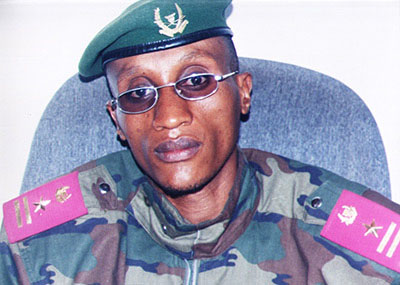
Here is the rebel leader Laurent Nkunda when he was
an officer of Rwanda Defense Forces.
After several failed attempts of this strategy, he now decides to use his own lieutenant, a former soldier of Rwandan army, Laurent Nkundabatware. How can a former Rwandan Army officer claim to defend and protect a Congolese ethnic group? It is a well-known fact that Nkundabatware Mihigo is a former Rwandan soldier, who served alongside James Kabarebe, before the 1994 genocide and after the Tutsis took over power in Rwanda.
Hence, let us not continue to cover up Nkunda's real identity. NKundabatware is a former Rwandan Army officer. There is no doubt whatsoever that he is a citizen of Rwanda. Hence, what is going on in eastern Congo is not a rebellion, but the continuation of Rwanda 's aggression and invasion of Congo that started in October 1996.
On
on April 6, 1994, President Paul Kagame was responsible for gunning down the plane transporting presidents Juvenal Habyarimana of Rwanda and Cyprien Ntaryamira of Burundi, causing the sudden death of two prominent Hutu's leaders and most of their key entourages.
The act angered the members of the Hutu ethnic group who responded by killing more than 500,000 Tutsi and moderate Hutu. Unfortunately, the international community chose to portray Paul Kagame as the person who ended the genocide rather than the person who caused it when his rebel movement took power in Rwanda in 1994.
Of course, Hutu extremists' savageries drew worldwide condemnations. Hutus in general and extremist Hutus in particular were portrayed as barbarous and savages. Tutsis, including Tutsi extremists, were viewed as innocent victims. Hutu extremists alienated most of their internal and international support, and lost power in Rwanda . Since then, the concept of "genocide" has become powerful propaganda machine that Tutsi extremists continue to effectively use to spread systematic lies, perpetual misrepresentations, deceptions, and intrigues to cover up both, their tribal hegemonic ambition in the Great Lakes Region, and the savage killings and terrors that they, themselves, organized against thousands of innocent people in eastern Congo (5).
Paul Kagame: Divide to conquer
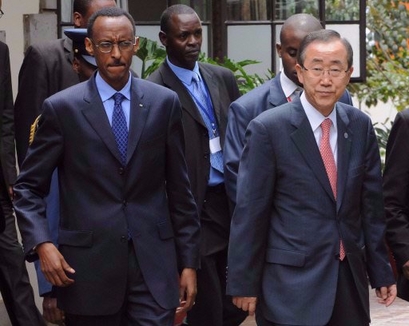
President Kagame is taking a lot of wrongheaded steps. Just look at the arrogance with which he is defying many European leaders or he is expelling European diplomats from Rwanda. The dropping out of French as Rwanda 's official language is to be viewed as a political message to France and Belgium than anything else. Rwanda does not have enough English-speaking educators at the moment. Some important preliminary, transitional linguistic preparations and curriculum reassignment have to happen first.
In the meantime, he is trying to please the United States and Great Britain by complying or breaking grounds with certain norms such as having more women than men in the Rwandan congress. A lie aimed at opposing and creating tensions and animosities between French-speaking countries on one hand and English-speaking countries on the other; so that Tutsi extremist leaders in Rwanda could perpetuate their regime in Rwanda.
Indeed, how can one explain the fact that Rwanda, a country with an overwhelming majority population made of Hutu has a large majority of the Tutsi ethnic minority in the parliament? The world can easily see the farce after all. If anything, the arrest of Rose Kabuye - the chief of protocol for the current Rwandan President Paul Kagame and recent Criminal Court of Paris acquittal of French writer and journalist, Pierre Pean, who was accused of complicity in racial defamation and provocation to racial discrimination following the publication in 2005 of his book "Black Furies, White Liars (Noires Fureurs, Blancs Menteurs)" on the 1994 Rwandan genocide should serve as a warning. (1).
In addition, the arrest warrants issued by France and Spain should not be taken lightly. The world stood by and watched Paul Kagame destroy the Congo twice. That will not be the case this time. The world will not allow President Paul Kagame to continue to blindly use the 1994 genocide in Rwanda as an excuse to perpetrate another genocide in eastern Congo.
Ultimately, the pursuit of minerals and power in the Congo will end up burning President Paul Kagame. Indeed, in the end, the world will turn against him because of his policies. The American actor
Ben Affleck summed up best the crisis in eastern Congo.
He said in a recent interview: "I'm not an expert in international affairs or diplomacy, but it doesn't take that to see the tremendous suffering here. It's not something that we as human beings can, in good conscience, ignore. I'm really glad that more people are paying more attention to Congo now but I'm really saddened that it's taken this increase in violence to make that happen." According to AFP, more than 200,000 displaced people are still living in the bush without food, water, or shelter as of today. Contracts with China: a lame excuse
Whatever reason invoked to constantly destabilize Congo does not resist any scrutiny. Even the newly concocted alibi of the contracts the Congolese government signed with China does not hold. Most Asian, African, American, and European governments have trade and commercial relations with China . For instance, in Africa, South Africa, Republic of Congo, Equatorial Guinea, Niger, Nigeria, Ivory Coast, Sudan, to name but a few… all have deals with China. In Europe, France, Germany and Belgium have signed a lot of contracts with China. In North America, the United States, Mexico and Canada do business with China.
Given these facts, why should the Democratic Republic of Congo not do the same? Much can be said about the nature of the contracts signed by President Kabila. But Uganda, Rwanda, and Burundi 's invasion of Congo started in 1996 and Laurent Nkunda took over Bukavu in 2004 when there was no talk of contracts with China . So, let us not fool ourselves!
The timing of rebels' new offensive
It is important to note the timing of Nkunda's offensive coincides with the election of a new American President. Rwanda expects President-elect Barack Obama to return to Bill Clinton's policies that allowed him to keep his troops in the Democratic Republic of Congo from 1998 to 2002 without any world's condemnation. President Barack Obama comes in office with an arsenal of Rwanda 's Democrat supporters: John Kerry, Bill Clinton, Susan Rice, Madeleine Albright, to name but a few.
We do understand the challenges that this may pose to the Congo, especially if Senator Hillary Clinton is named Secretary of State by President-elect Obama. Her husband, Bill Clinton, is involved in some shady business deals through Rwanda with some mining companies that are operating in the Congo. Many Congolese people fear that Hillary Clinton, whose husband is a self-proclaimed private counselor to President Paul Kagame, is not good for the Congo. The Congolese people do hope that Secretary of State Hillary Clinton will follow an agenda set by President Barack Obama. Yaa-Lengi Ngemi, President of the New York-based Coalition for Peace, Justice, and Democracy in Congo-Zaire, who volunteered in the Obama's presidential campaign, noted that “the mining companies and the individuals benefiting from the Congo-Zaire genocide of already over 5.4 million have been great friends of and donors to Bill Clinton and his "benevolent" enterprises.” (3)
Indeed, Kagame must have noticed that President-elect Barack Obama avoided questions regarding the humanitarian disaster in the Congo. He must also have observed that Obama's vice-president, Senator Joe Biden, advocated the partition of Iraq. This is the reason why Kagame decided that it made sense for his sidekick Laurent Nkunda to control a huge chunk of Congo 's territory before President Obama was sworn in. He saw his expansionist and economic dream materialize with the Democrats' return to power in the United States.
What can be expected of President Obama?
 Let it be noted that the partition of Congo will not happen, not even under Obama's presidency. As a matter of fact, many Congolese have been lobbying even before the brilliant victory of President-elect Obama. Furthermore, the whole world has learned that the pretext of Hutu threat for another genocide in Rwanda that Rwanda continues to use in order to control part of Congo does not stand the test of any serious analysis. Let us also keep in mind that President-elect Barack Obama has an African father. It is not obvious that he will support policies that foster genocide and economic exploitation in Africa. Let it be noted that the partition of Congo will not happen, not even under Obama's presidency. As a matter of fact, many Congolese have been lobbying even before the brilliant victory of President-elect Obama. Furthermore, the whole world has learned that the pretext of Hutu threat for another genocide in Rwanda that Rwanda continues to use in order to control part of Congo does not stand the test of any serious analysis. Let us also keep in mind that President-elect Barack Obama has an African father. It is not obvious that he will support policies that foster genocide and economic exploitation in Africa.
As a matter of fact, let us recall that it is the U.S. Senator Barack Obama (D-IL) who, on October 10, 2007 wrote to Secretary of State, Condoleezza Rice, to express his concerns about the growing number of systematic sexual assaults against women in the Democratic Republic of the Congo (DRC). It is Senator Barack Obama who introduced The Democratic Republic of the Congo Relief, Security and Democracy Promotion Act, which identifies such systematic sexual violence as a particular threat in Congo in December of 2005. The legislation was signed into law on December 22, 2006 . In that letter, Senator Barack Obama inquired about the nature of U.S. support for efforts to build the new Congolese armed forces and what elements of that support, if any, raise awareness about the importance of this issue of sexual violence? He also wondered about whether the U.S. was ensuring that the UN, and all countries that contribute troops to MONUC, are abiding by codes of conduct for the prevention of sexual abuse and trafficking.
So President-Elect Obama has shown in the past that he cared about the situation in Democratic Republic of Congo. True, he visited Rwanda in 2006 but was advised by the State Department against visiting the Democratic Republic of Congo. He would have seen first-hand what the Congolese people are going through unlike President George W. Bush who visited Rwanda but was unable to cross the border and see with his own eyes the victims of violence just next door.
Barack Obama remained committed to the Congo cause. He even urged President Bush to address the Congo crisis in 2006. In his message, he indicated that “It's time the Administration stops ignoring the call by Congress to appoint a special envoy to the DRC, and strengthen the U.N. peacekeeping force which is working to stabilize the eastern part of the Congo. The seriousness of the situation there was recently highlighted by devastating reports about the escalation of sexual violence against women in the region.” (2). He also asked Secretary Condoleezza Rice for answers as to how the US government would help curb the violence. It is worth mentioning that Colin Powell did more about the conflict in the Congo than Condoleezza Rice.
Conclusion
Evidently, the genocide of the Tutsi ethnic group has proven to be such a good sale for President Kagame in the western world. He seems to desperately seek another disaster that can help his country harness the world's sympathy. The dividends harvested from the 1994 genocide seem to be wearing out. Congo is a good ground for another.
Although President Paul Kagame claims that Rwanda has nothing to do with the war in the Congo, all evidence points to the involvement of his country. The logistics used by the rebels, the material evidence collected at the Rumangabo military camp, the presence of Rwandan Defense Forces among Nkunda's men, the firing from Rwanda during Nkunda's offensive, his announcement that he was not interested in negotiations with the government of the Congo followed a couple of days later by an attack by Nkunda's men, the UN Mission in the Congo confirming the participation of Rwandan troops in the war, etc all show without a doubt that Rwanda is actively invloved in the war in the Congo. There is ample evidence of Rwanda 's direct and indirect involvement in the war. President Paul Kagame and the rebel leader Laurent Nkunda openly proclaim that they are intent on fighting the FDLR in the Congo. That cause seems to have united these two look-alike “brothers”.
Let us seize this opportunity to remind President Joseph Kabila that he must not give Rwanda reasons to continue to destabilize the Congo. The United States continues to share Rwanda 's view that The Democratic Forces for the Liberation of Rwanda (FDLR) are the root cause of instability in eastern DRC (4). It is most imperative that he undertakes the necessary steps to attempt to disarm the remaining Hutu militiamen in the Congo (whatever their number) in full view of the international community. He needs to show his good will and his willingness to comply with the peace agreements that he signed. He also must not just sit back and wait. The country must be reunited by dialogue or by force if necessary.
As for Rwanda, even if the international community does not pay Rwanda back for helping overthrow President Mobutu, Rwanda is already paying itself in the Congo. All raw minerals and rare species from the Congo are traded in Rwanda. No wonder Rwanda is rebuilding…fast, without any apparent creative imagination from its leaders. Killing and looting in the Congo do not require too much thinking or planning. Just watch out for those “sleeping and hospitable Congolese lions.” They can inflict terrible harm with unforeseen consequences. You may not see it coming. History must always serve as prologue that should be revered and not ignored. President Paul Kagame has raised the issue of creating a buffer zone in eastern Congo countless times. Has he ever imagined the Congo wanting a buffer zone inside Rwanda to avoid future harassments?
It is most imperative that the world community acts. Silence is complacency; silence grants a seal of approval. To paraphrase Dr. Martin Luther King Jr., let me conclude by saying that in the end, the Congolese people will remember not the words of their enemies but the silence of their friends. They will remember vividly the silence of their African friends, their American friends, their European friends, their Asian friends, the silence of human rights organizations, the silence of the media, the silence of heads of states, the silence of prolific figureheads, the silence of opinion leaders, the silence of actors, singers, and so forth. When will our friends break their silence about this senseless war and act boldly to stop it? The threat to regional stability in the Great Lakes region of Africa that President Kagame and rebel leader Laurent Nkunda represent must be annihilated now rather than later. In the name of peace.
-------------------------------------------------
(1). Pierre Péan, Noires fureurs, blancs menteurs ( Black furies, White liars) : Rwanda 1990-1994 (Mille et une Nuits, Paris, 2005) ISBN : 2842059298.
(2) Obama Asks Rice to Address Violence Against Women in the Congo : Washington D.C. October 11, 2007. http://obama.senate.gov/press/071011-obama_asks_rice/
(3) Open Letter to President Obama: For The Sake of Change in Africa , Please, No Clintons ! New York . November 23, 2008 . Congo Vision.
http://www.congovision.com/forum2/lengi_ngemi1.html
(4) Release of FDLR Secretary General, Callixte Mbarushimana. November 13, 2008 . 22:00:00 -0600. Washington , DC . U.S. Department of State.
http://www.state.gov/r/pa/prs/ps/2008/nov/111822.htm
(5) Sloj S. Litofe, “What Susan Rice Must Know: How to Effectively End Museveni's and Kagame's Terrorism, Barbarism, and Vandalism in the Democratic Republic of Congo?” http://www.congonline.com/Forum1/Forum01/Litofe03.htm. © Congo Vision
Published Novermber 25, 2008
Also read:
|

